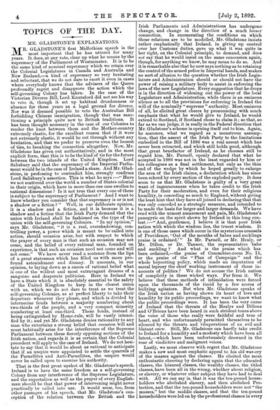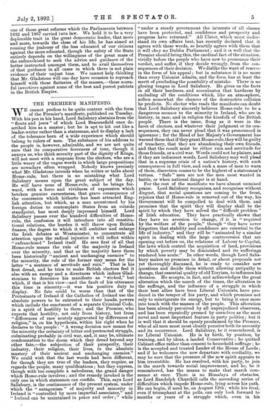TOPICS OF THE DA_Y.
MR GLADSTONE'S EXPLANATIONS.
it/LB. GLADSTONE'S first Midlothian speech is the most important that he has uttered for many years. It does, at any rate, clear up what he means by the supremacy of the Parliament of Westminster. It is to be the same kind of nominal supremacy which we retain over the Colonial Legislatures in Canada and Australia and New Zealand,—a kind of supremacy so very hesitating and reluctant, that we do not dare to exert it even in cases where everybody knows that the advisers of the Queen profoundly regret and disapprove the action which the self-governing Colony has taken. In the case of the Victorian Divorce Bill, Lord Knutsford did not see his way to veto it, though it set up habitual drunkenness or absence for three years as a legal ground for divorce. Nor was it deemed possible to veto the Australian Bill forbidding Chinese immigration, though • that was sanc- tioning a principle quite new to British traditions. It has been thought necessary in the case of our Colonies to render the knot between them and the Mother-country extremely elastic, for the excellent reason that if it were not extremely elastic, it would be cut through without any hesitation, and that we prefer to preserve even the loosest of ties, to breaking the connection altogether. Now, Mr. Gladstone has given out authoritatively, and in the most explicit form, that this is to be the kind of tie for the future between the two islands of the UnitEd Kingdom. Lord Salisbury said that the supremacy of the Imperial Parlia- ment would be in the case of Ireland a sham. And Mr. Glad- stone, in professing to contradict him, strongly confirms Lord Salisbury's assertion. This is what he says :—" Have we not scattered over the world a number of States colonial in their origin, which have in more than one case swollen to national dimensions ? Is it not true that every one of these is subject to the supremacy of Parliament ? And I want to know whether you consider that that supremacy is or is not a shadow or a fiction ? " Well, in our deliberate opinion, it is a shadow and a fiction, and it is because it is a shadow and a fiction that the Irish Party demand that the union with Ireland shall be fashioned on the type of the union with the self-governing Colonies. "In my opinion," says Mr. Gladstone, "it is a real, overshadowing, con- trolling power, a power which is meant to be* called into action, should occasion arise, but with respect to which the prayer of every man is that such an occasion may not come, and the belief of every rational man, founded on experience, is that such an occasion need not come and will not come." We have never read a sentence from the lips of a great statesman which has filled us with more pro- found astonishment and dismay. It amounts, in our opinion, to laying down as a canon of rational belief what is one of the wildest and most extravagant dreams of a sanguine and desperate politician. Here in Ireland we have a State which it is absolutely essential to the safety of the United Kingdom to keep in the closest union with us, which we do not dare to treat as we treat the self-governing Colonies, as at perfect liberty to take their departure whenever they please, and which is divided by internecine feuds between a majority numbering about two-thirds of the people, and a very compact minority numbering at least one-third. These feuds, instead of being extinguished by Home-rule, will be vastly intensi- fied by it ; and yet Mr. Gladstone denies rationality to any man who entertains a strong belief that occasion will and must habitually arise for the interference of the Supreme Parliament between these fiercely opposing sections of the Irish nation, and regards it is as certain that the Colonial precedent will apply to the case of Ireland. We do not hesi- tate to say that it would be about as rational to anticipate that if an umpire were appointed to settle the quarrels of the Parnellites and Anti-Parnellites, the umpire would never be called upon to exercise his authority.
That is the first great upshot of Mr. Gladstone's speech. Ireland is to have the same freedom as a self-governing Colony from any interference of the Supreme Legislature, and the expectation as well as the prayer of every English- man should be that that power of intervening might never practically be called into use. It would seem, too, from other passages of his speech, that Mr. Gladstone's con- ception of the relation between the British and the Irish Parliaments and Administrations has undergone. change, and change in the direction of a much looser connection. In enumerating the conditions on which those relations are to be modelled, Mr. Gladstone insists rather emphatically that Ireland, in giving up control over her Customs duties, gave up what it was quite in. her right, on the Colonial principle, to demand, and doea not say that he would insist on the same concession again,. theugh, for anything we know, he may mean to do so. And it is remarkable also that he now says nothing as to retaining- the control of the armed police in Imperial hands, and makes no sort of allusion to the question whether the Irish Legis- lature and Administration should or should not have the power of raising a military body to assist in enforcing the laws of the new Legislature. Every suggestion that he drops is in the direction of widening out the power of the local Legislature and Administration, while there is an ominous. silence as to all the provisions for enforcing in Ireland the will of the nominally "supreme " authority. Most ominous of all, he elicited great cheers by pronouncing with much emphasis that what he would give to Ireland, he would extend to Scotland, if Scotland chose to claim it ; so that, so far as we can judge, it is really in the Federal direction that Mr. Gladstone's scheme is opening itself out to him. Again, he assumes, what we regard as a monstrous assump- tion, that the assent of the Irish Party to the limitations- embodied in the Bill of 1886 was a real assent which has never been retracted, and which still holds good, although that great benefactor of Ireland, as he chooses still to. regard him, Mr. Parnell, openly declared that what he accepted in 1886 was not in the least regarded by him or his colleagues as a final settlement, but only as the thin end of the wedge by which he hoped greatly to enlarge the area of the Irish claims, a declaration which has since been echoed by every section of the exploded party. It does seem to us that Mr. Gladstone is guilty of a very great want of ingenuousness when he takes credit to the Irish Party for their moderation, and even for their religious humility, in conceding so much to England, without giving the least hint that they have all joined in declaring that that was only conceded as a strategic measure, and intended to- be made the basis for larger and larger demands. We have read with the utmost amazement and pain, Mr. Gladstone's. panegyric on the spirit shown by Ireland in this long con- test :—" And, gentlemen, I believe it is that poet. Irish nation with which the wisdom lies, the truest wisdom. It is one of those cases which occur in the mysterious counsels of Providence, 'Out of the mouths of babes and sucklings praise is ordained." Is Mr. Parnell, or Mr. Healy, or Mr. Dillon, or Dr. Tanner, the representative babe and suckling ? And what is the praise which has been ordained,—the praise of Committee-room No. 15, or the praise of the "Plan of Campaign" and the whole boycotting policy, which made an imputation of moral leprosy the chief working instrument of those in- nocents of politics ? We do not accuse the Irish nation of complicity in these wicked ways. Far from it. We believe that these methods of intimidation were forced upon the thousands of the timid by a few scores of bullying agitators. But when Mr. Gladstone speaks of the Irish nation as having shown its heart of love and humility by its public proceedings, we want to know what the public proceedings were. It has been the very curse of Ireland that the threats of the Healys and Dillons and O'Briens have been heard in such strident tones above the voice of those who really were faithful and true of heart, and who unfortunately permitted themselves to be silenced by the threats and vituperations of an evil and blatant crew. Still, Mr. Gladstone can hardly take credit to Ireland for a humility and a modesty which have been all latent,—which have been unfortunately drowned in the roar of vindictive and malignant voices.
Lastly, we must observe with regret that Mr. Gladstone makes a new and most emphatic appeal to his old war-cry of the masses against the classes. He elicited the most enthusiastic cheering by declaring again that the educated classes, the leisured classes, the wealthy classes, the titled classes, have been all in the wrong, whether about religion; or slavery, or whatever other subject they have had to deal with. All we can say is, that it was the ten-pound house- holders who abolished slavery, and then abolished Pro- tection, and that the ten-pound householders were not " the masses," but the middle classes, and that the ten-pound householders were led on by the professional classes in every one of those great reforms which the Parliaments between 1832 and 1867 carried into law. We hold it to be a very deplorable trait in the great democratic leader, that more and more, towards the close of his life, he has aimed at rousing the jealousy of the less educated of our citizens against the more educated, though the safety of the State entirely depends on the willingness of the great mass of the enfranchised to seek the advice and guidance of the better instructed amongst them, and to avail themselves of that guidance in all cases in which there is not plain evidence of their unjust bias. We cannot help thinking that Mr. Gladstone will one day have occasion to reproach himself with these flatteries of the masses,—these scorn- ful invectives against some of the best and purest patriots in the British Empire.











































 Previous page
Previous page